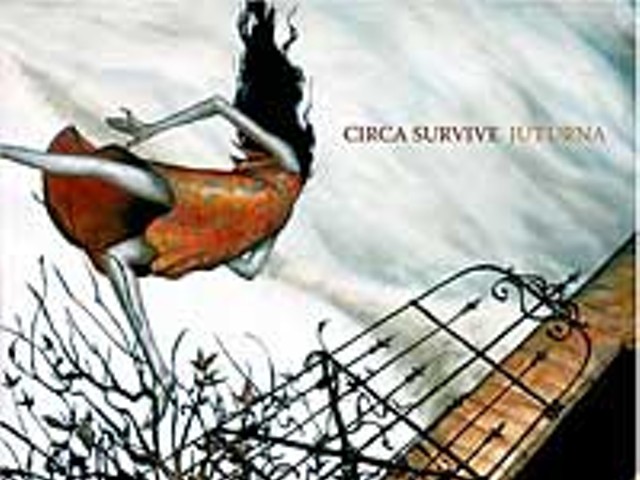The five guys of Ann Arbor’s Great Lakes Myth Society are seated around a table in the Garden Bowl bar, nursing beers. It’s a Tuesday evening and the gents — clad rather anomalously in button-down shirts and brightly colored ties — are relaxed, talkative and gearing up for a gig later that night.
It’s no surprise then that the mood this evening is light. There’s confidence. The band’s impressive live shows have earned them a flock of new fans through word of mouth, and the group’s self-titled album has received emphatic praise in both local and national press.
The band (guitarist-singers Gregory McIntosh, Timothy Monger and his older brother James, plus bassist J. Scott McClintock, and drummer Fido Kennington) talks about everything from a shared love of their home state to how Neil Diamond, Queen, sea chanteys and, of all things, Iron Maiden helped shape their pop-Americana sound. And after nearly a decade of playing together in one form or another, there’s obvious camaraderie, and it shows in the songs. They’ve been friends for years. During conversation they often finish each other’s sentences, and it’s more gracious follow-up than it is interruption.
"What one of us says, the others will stand behind it," James says, casually.
While James and his brother Timothy serve as the band’s main songwriters and unofficial frontmen, it’s obvious that all involved are equal contributors.
Quick history lesson: This lineup grouped in the ’90s as the Original Brothers and Sisters of Love and released two albums. Before their third album could be released, the band’s label went bankrupt and violinist Liz Auchinvole moved to Toronto to start a family, leaving the remaining crew to start anew. That record, recorded in 2003, is the Great Lakes Myth Society’s self-titled "debut."
"The band felt like it was splintering as we recorded [the album]," Timothy says.
"And the old name was a hindrance for us because people thought we were a hippy jam band," James adds, laughing.
The songs on this "debut" are poppy, literate and lush, accented with strings, accordion, banjo, toy piano and harmonica. Liberal amounts of recorded street noise enhance the group’s narrative tales, which are often fused with imagery of Michigan’s natural features and history. The men of GLMS are open about identifying themselves emotionally with the state, and these 15 songs create more "big mitten" interest than any middle-school state history class ever could. It’s almost as if some "Yes, Michigan!" folks went haywire and recorded an album that the Decemberists could only wish they had. There’s real sensitivity and depth.
An ode to the city of Novi ("No. VI") sounds especially epic. Part of the song’s appeal comes from its banjo twang and unusual percussive devices — handclaps, foot stomps and recordings of a train rolling down tracks. The song swells and is capped with this eagle-eyed observation: "Number Six on the line/To all passersby/Was N-O-V-I."
The poignant (yes, poignant) "Isabella County, 1992," was inspired by James’ stint in Mt. Pleasant. The somber yet optimistic tune refers to such landmarks as the Broadway Theater and the Chippewa Dam, then closes with this goose-bump-goading coda: "Sweetheart, this city has beautiful snow."
The powerful "Buffalo Nickel" uses the same folkish approach, only aggressively. The song builds around thunderstorm sounds, which James says he recorded by holding a microphone out of his Ann Street window when he and his brother once shared a house. James growls "Buffalo Nickel on the concrete," while Timothy wraps ghostly, high-pitched near-whispers around them. The result is a tremendously layered slow burn that builds to a feverish crescendo.
While the Monger brothers write songs that are more expressive in their Michigan themes, McIntosh’s material is a bit off the local map, so to speak.
"For me, it’s weird — I’m in a band with my two favorite songwriters, and these guys kick out these amazing lyrics that are really descriptive, and I don’t find myself in that same category. So I kinda went a different route," McIntosh says.
McIntosh’s songs give the album a different kind of gravity; there’s a certain drone that dovetails seamlessly with long stretches of cold winter days and hot summer nights.
Though the disc is rife with Midwestern Americana overtones, the songs’ pop sensibility weighs in. The entire album is drenched in dense backing vocals that might recall the Beach Boys.
James perks up at the often-tired Beach Boys reference. "When I was in second grade, my parents came running into my bedroom at 3:30 in the morning because ‘Good Vibrations’ was playing on the clock radio, and they decided that they wanted me to hear it," he says. "There’s a reason so many people quote them as an influence — it’s because they’re fucking great."
The band’s live set is polarizing; equal parts campfire sing-along and cathartic rock show. Crisp, four-part a cappella harmonies color sets that, in a tense rock ’n’ roll sense, belie the album’s tone — even Timothy’s occasional accordion playing is aggressive. With a glowing yellow lantern set on stage as a kind of metaphorical beacon, the band deftly weaves its stories and musical subtleties in a gritty fog born of three resonating guitars.
What about other influences and reference points? While all of the band members are heavy readers, James comes clean: "The embarrassing answer to that is, honestly, being weaned on Iron Maiden," he says, laughing. "It started out that all of my stuff from eighth grade was all just fantasy metal lyrics, and this is just the logical conclusion."
There’s other stuff too. McClintock tells of meeting James through a mutual love of the early ’80’s Popeye movie sound track "That’s how we’re friends," he says, proudly.
James finishes: "There’s no such thing as a guilty pleasure … because, why else would you even bother?"
Good question.
"We make music because we can’t stand not to, I think — when you listen to so much good music, you have to be involved," McClintock adds. A round of guffaws punctuates his words. Then, as if on cue, the band collectively ‘oohs,’ which is followed by a moment of silence — a tribute to The Four Tops’ "Reach Out, I’ll Be There," which floats out of the Garden Bowl’s speakers.
It’s a telling moment because after three albums and almost a decade together in various incarnations, the band still shares a common musical goal.
"We’ve got to do the ‘Star-Spangled Banner,’" James says, excitedly. "We can do it like a sea chantey."
A huge smile creeps across Timothy’s face at the thought. Then he says loudly, "Oh, dude, that’s my dream to do the ‘Star-Spangled Banner’ at a Tigers game!" The ever-quiet Kennington chimes in suddenly, finishing Timothy’s sentence with "Barbershop quartet-style." At that, the band nods quietly in agreement.
Friday, June 3, at Smalls (10339 Conant, Hamtramck; 313-873-1117) with the Fluoride Program and Porchsleeper.
Gary Blackwell is a freelance writer. Send comments to [email protected]




